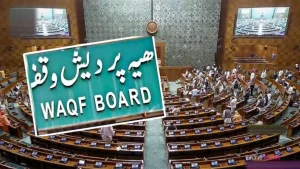New Delhi – The Lok Sabha recently passed the Waqf Amendment Bill 2025, which brings significant changes to the management and administration of Waqf properties across India. The government claims these amendments will improve transparency and accountability in the functioning of Waqf boards, but opposition parties and various organizations have raised concerns, alleging that the amendments may discriminate against the Muslim community.
Key Amendments in the Waqf Amendment Bill 2025

The Waqf Amendment Bill 2025 introduces 14 major changes to the existing framework governing Waqf properties. These amendments aim to reform the administration, prevent misuse of Waqf assets, and ensure greater efficiency in the management of these properties. Below are the key changes:
- Inclusion of Non-Muslim Members in Waqf Boards: The bill mandates the inclusion of non-Muslim members in both the Central Waqf Council and state Waqf boards. This move is aimed at fostering inclusivity and ensuring a broader representation in the decision-making processes of Waqf institutions.
- The Waqf Amendment Bill 2025 seeks to change the name of the Waqf Act, 1995 to the Unified Waqf Management, Empowerment, Efficiency, and Development Act, 1995.
- Government Authority Over Disputed Properties: The Waqf Amendment Bill 2025 empowers the government to determine ownership of disputed Waqf properties. The objective of this amendment is to resolve longstanding disputes and ensure the proper utilization of these assets.
- Abolition of Unilateral Property Declaration: The Waqf Amendment Bill 2025 removes the provision that allowed Waqf boards to unilaterally declare a property as Waqf without external verification. This change aims to prevent arbitrary claims and misuse of Waqf laws for acquiring properties unfairly.
- Enhanced Oversight and Transparency: The Waqf Amendment Bill 2025 also says that any government property identified as waqf will cease to be so. The bill removes the provision empowering the Waqf Board to inquire and determine if a property is waqf.
- Exclusion of Certain Trusts from Waqf Classification: The Waqf Amendment Bill 2025 specifies that trusts established by Muslims under any legal framework will no longer be automatically classified as Waqf properties. This ensures that private trusts retain complete control over their operations without interference from Waqf boards.
- Mandatory Government Approval for Property Claims: The Waqf boards must now seek approval from district-level officers before claiming any property as Waqf. This step ensures proper verification and documentation, preventing unauthorized claims.
- The Waqf Amendment Bill 2025 also allows the central government to make rules regarding registration, publication of accounts of waqf, and publication of proceedings of waqf boards. The Centre can also order an audit of the accounts of waqfs by the CAG or a designated officer.
- Time-Bound Resolution of Disputes: A mechanism has been established to resolve disputes related to Waqf properties within a fixed timeframe. This ensures that legal cases involving Waqf land do not drag on indefinitely.
- Enhanced Penalties for Mismanagement: The bill introduces stricter penalties for those found guilty of mismanagement or misappropriation of Waqf properties. This amendment aims to deter fraudulent activities and encourage responsible administration.
- Public Disclosure of Information: Waqf boards will now be required to publicly disclose information regarding their decisions and management practices. This will allow the public to monitor Waqf administration and hold authorities accountable.
- Community Participation in Decision-Making: The Waqf Amendment Bill 2025 encourages greater community participation in the decision-making processes of Waqf boards. This amendment ensures that the interests of local stakeholders are adequately represented.
- Standardization of Procedures Across States: The Waqf Amendment Bill 2025 seeks to establish uniform procedures and practices for Waqf management across different states. This will create a more streamlined and coherent system for handling Waqf properties nationwide.
Parliamentary Debate and Opposition Concerns

The passage of the Waqf Amendment Bill 2025 followed extensive debates in the Lok Sabha, with heated arguments from both government and opposition members. While the ruling party emphasized the need for reform, opposition leaders and various organizations strongly opposed the amendments.
- Allegations of Discrimination: Critics argue that the inclusion of non-Muslim members in Waqf boards undermines the autonomy of Muslim institutions and interferes with religious endowments. Many see this move as an unnecessary intrusion into the affairs of the Muslim community.
- Concerns Over Property Rights: There is significant apprehension that granting the government authority over disputed Waqf properties could lead to the confiscation of historic mosques and other important assets. Opposition leaders claim this provision infringes upon the constitutional rights of the Muslim community.
- Legal Challenges and Protests: Various organizations have announced plans to challenge the bill in court, arguing that it is “discriminatory” and “communally motivated.” Nationwide protests are also being organized to pressure the government into reconsidering some of the provisions.
Government’s Justification


The government, represented by Union Minority Affairs Minister Kiren Rijiju, has defended the Waqf Amendment Bill 2025, stating that the amendments aim to eliminate corruption and inefficiency within Waqf institutions. The inclusion of non-Muslim members, according to the government, is intended to make Waqf boards more inclusive and secular.
The ruling party asserts that past mismanagement of Waqf properties has resulted in massive financial losses. The reforms introduced in the bill, they claim, are designed to ensure accountability and prevent further exploitation of Waqf resources.
Implications for the Muslim Community
India’s Muslim population, which constitutes approximately 14% of the nation’s total, views the bill with significant concern. Many within the community believe that the amendments will lead to increased government control over Waqf properties, limiting their autonomy.
Several Muslim organizations fear that the abolition of unilateral property declaration and the requirement for government approval in property claims could lead to prolonged legal battles and administrative delays, potentially weakening the Waqf system.
Broader Context and Future Outlook
The introduction and passage of the Waqf Amendment Bill 2025 come against the backdrop of heightened tensions between the government and minority communities in India. In recent years, similar legislation affecting religious endowments and minority institutions has faced strong pushback.
The bill’s progression through the legislative process will be closely watched. Many legal experts anticipate that some provisions may be challenged in the Supreme Court, leading to prolonged judicial review. Additionally, protests and political mobilization against the Waqf Amendment Bill 2025 are expected to intensify in the coming months.
Closing Remarks
While the government maintains that the Waqf Amendment Bill 2025 is a necessary step toward reforming the management of Waqf properties, opposition voices underscore the complexities and sensitivities involved. The debate surrounding the Waqf Amendment Bill 2025 highlights the delicate balance required when modifying laws governing religious endowments.
The passage of the Waqf Amendment Bill 2025 marks a significant moment in India’s legislative landscape. However, the ongoing resistance and potential legal battles indicate that its implementation may not be smooth. The coming months will be crucial in determining the long-term impact of these amendments on Waqf management and the broader socio-political environment in the country.

